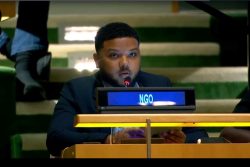President Putin’s visit to North Korea and the revival of a Cold War defence treaty of mutual support has exacerbated the security concerns of the West, the US, South Korea and Japan. The war in Ukraine, which has shaken up the economic, political and security situation in the US, Europe and further afield continues to impact wider regions of the world. Arising from Russia’s invasion of Ukraine in February 2022, referred to by Russia as a “Special Military Operation” because its stated objective is self-defence, the war has continued unabated and shows no sign of ending. The declared fears appear to be that Russia intends to overrun Ukraine and then move on to other areas of Eastern Europe in an effort to restore the ‘Soviet Empire.’ So loud have been the alarm bells about European security that Finland and Sweden have formally joined NATO. China, India and countries of the South see the war differently and have refused to join the West in prosecuting the war.
They probably see that the war has roots deep in the Cold War. NATO’s expansion eastwards violated a promise made to President Gorbachev by the senior President Bush. The junior President Bush’s proposal in 2008 to incorporate Ukraine and Georgia into NATO was opposed by Russia which saw it as an existential threat to its security. Later in 2008, an unmistakable message was sent by Russia’s invasion of Georgia. The West did not let up. The removal of Ukraine’s pro-Russian President by way of a Western supported coup and the installation of a pro-Western President was followed by Russia’s invasion of Crimea and set the stage for the war. Efforts to resolve the crisis turned out to be ruses, exposed by Angela Merkel, to seek time to build up Ukraine’s armed forces.
The war has created wide-ranging disruptions. Since the end of the Cold War, Russia had built up strong economic relations with European countries principally through its sale of gas at competitive prices. The sanctions destroyed these economic relations resulting in higher gas and gasoline prices in the West which triggered widespread inflation, declining production levels and economic hardships. This gave rise to the growth of rightwing ideology and political parties across the West, recently demonstrated in elections for the European Parliament. Despite the success of President Biden’s economic and domestic policies, his campaign for re-election is struggling against Trump’s rightwing MAGA ideology. A large swath of the American voter population appears to believe that the economy is their biggest issue and that former President Trump is better placed to manage it.
The recent G7 meeting of the wealthiest countries in the world, which excluded China and Russia, emphasized the alleged, enhanced, threat to their security arising from Russia’s invasion and pledged continued economic and military support for Ukraine, using US$50 billion in interest earned from Russian reserves held in the West and other sums. As if in response, immediately after the G7 meeting President Putin made a visit to North Korea, (the Democratic People’s Republic of Korea) (DPRK), Vietnam and Cambodia. President Putin revived a Cold War agreement with North Korea for the countries’ mutual defence of each other in the event of attack. The US and other Western countries expressed alarm at the visit, the purpose for which they believed was for North Korea to supply ammunition to Russia. They believed that the quid pro quo was Putin’s potential assistance to North Korea in further developing its nuclear-armed and nuclear-powered weapons, submarines and other systems. This concern was aggravated when Putin declared, in response to South Korea’s declared policy to supply weapons to Ukraine, that Russia was prepared to supply weapons to North Korea. The widespread disruptions created by the Ukraine war in Russia, the US and Europe have now migrated to Asia and increased the fears of South Korea and Japan that North Korea’s military and nuclear capacity may be enhanced because of Russia’s need for North Korea’s ammunition. North Korea is perceived as posing a deadly threat to the peace and security of the United States and now of Asia.
After the end of the Cold War, Gorbachev expressed the wish to improve relations with the West. Many innovative policy initiatives were proposed. These included the abolition of NATO and the Warsaw Pact and the establishment of a common European home. Boris Yeltsin was as pro-West as any leader could be. Putin developed economic relations with the West, asked to join NATO, cooperated with the West in the war against terror, was a partner with the West in the resolution or attempted resolution of many international problems, including being a member of the six-country group on North Korea. From being a country which supported sanctions against North Korea, Russia now threatens to supply arms. How did this happen? How did several decades of cooperation between Russia and the West unravel so quickly. If this was seen as a bad thing in the West, what were the efforts made to arrest the deterioration of relations with a large nuclear power? Were Russia’s security concerns addressed or ignored?
(This column is reproduced with permission from Ralph Ramkarran’s blog, www.conversationstree.gy)








